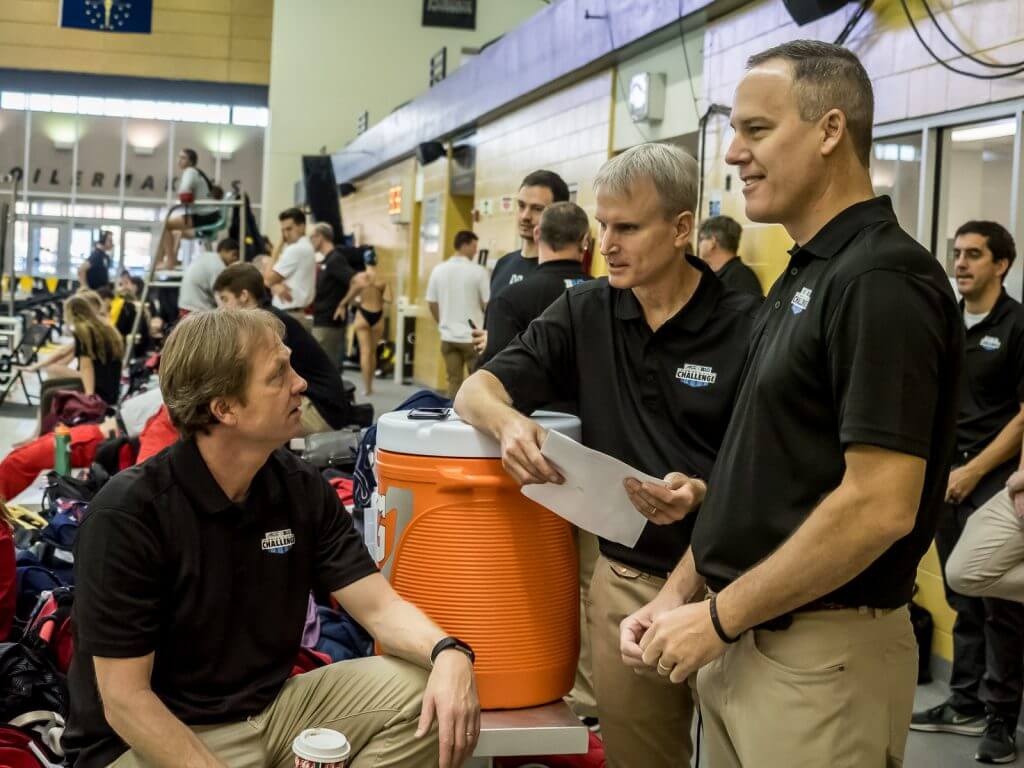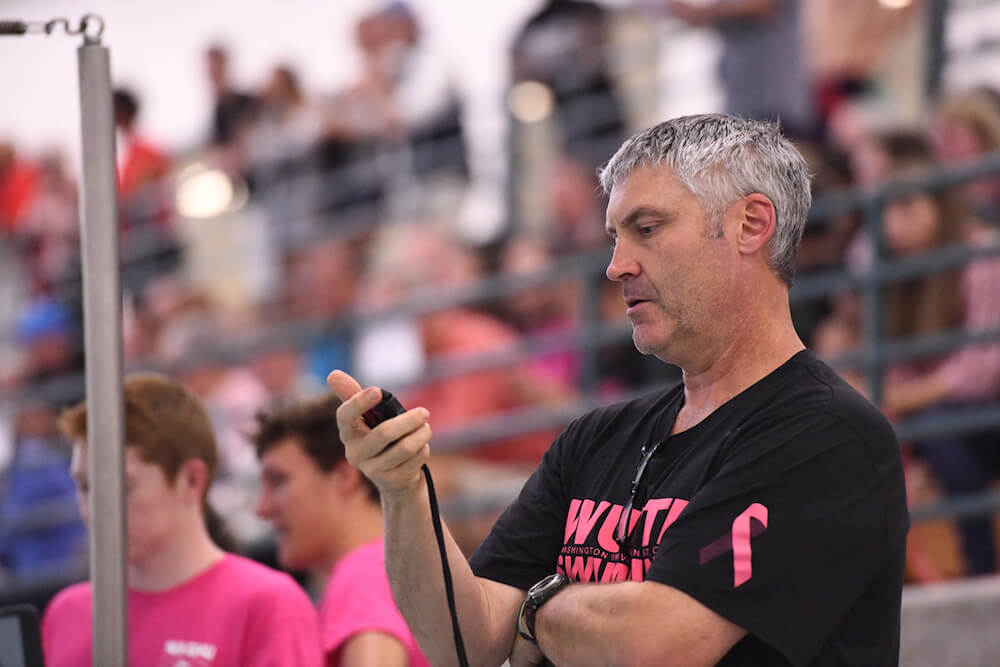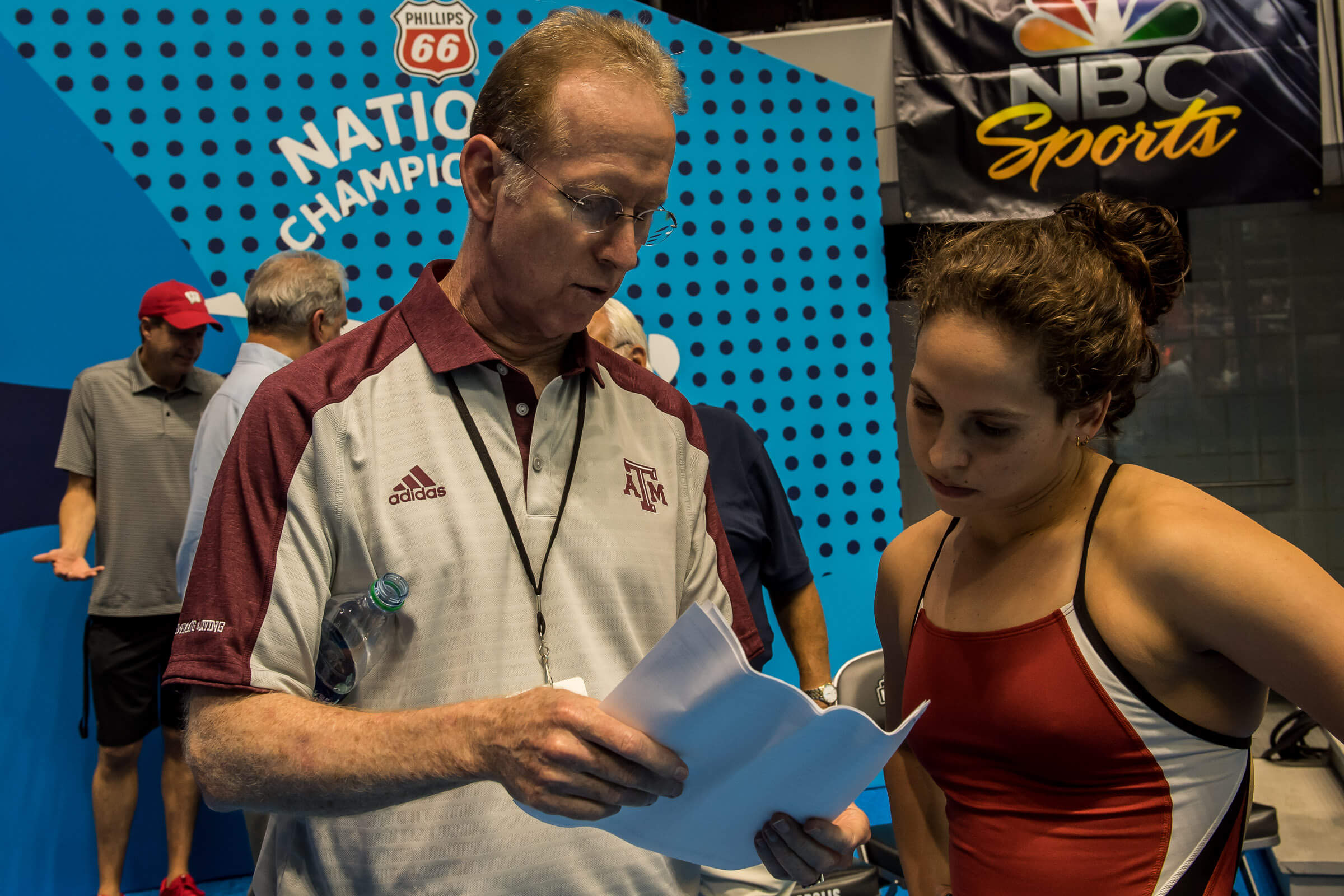No, It’s Not Your Coach’s Fault: Why You Shouldn’t Complain About the Coach

By Ryan Gibbons, Swimming World College Intern.
It’s an unfortunate thing we frequently hear in and out of the pool and one that – albeit with regret – some of us may have let slip before: complaining directly about the coach.
Despite their years of experience, hours toiled over helping their swimmers attain perfection, and long records of success, swimmers frequently find ways to complain. Swimmers may complain about the quality of their coaching, mope about the decisions being made by coaches, or even outright blame the coach for their failure to achieve a goal.
Not only is this negative attention almost always undue, but it also leads to intense and detrimental decreases in morale and confidence – even to the point of causing deep divisions and breaks within a team. While any coach understands the importance of communicating with swimmers when either party feels a change may be helpful, outright complaining or spreading negative comments only hurt all involved. Here’s why complaining about the coach – from hard practices, to abnormal schedules, to meet entries – should never be considered an acceptable option.
They’re Probably Right

Face it: anyone complaining about their coach has probably been swimming for a solid handful of years. They’ve likely trained under numerous coaches during their upbringing, and have a decent idea of the sport from a swimmer’s perspective.
Coaches have devoted their lives to the sport and have gained both formal training and on-deck experience for years – even decades – longer than you have, especially if they grew up swimming as well (which most have). They have likely coached hundreds, even thousands, of swimmers over the years. It’s a very likely assumption that their opinion, formulated on years of similar examples and experiences, is more effective than yours.
This hardly means that all coaches are infallible. If a swimmer feels that a decision made is detrimental to their training and success, it’s their responsibility to maturely discuss this with their coach. However, simply complaining to teammates and promoting an attitude in opposition to the coach is both disrespectful and immature. If a coach gives a final judgement, it’s also the swimmers responsibility to honor it. Remember: it’s almost certainly going to be the right judgement.
Complaining Hurts the Team

Not only does complaining about your coach fracture the trust between you and them if (and when) they find out, but it can also be quickly spread to the rest of your teammates. Whether it be through additional opposition to the coach or divisions with those defending the coach, these simple complaints can quickly create a hostile environment – something that almost inevitably has negative effects on performance.
This sense of hostility can also give way to a lack of confidence. Swimmers who hear time and time again from their teammates that their coach is wrong, regardless of their confidence in the coach, they can quickly develop even feeble doubting feelings. These doubts, however unjustified, can become hard to ignore. This can lead to a lack of confidence come competition time, affecting the performance of teammates who did nothing wrong.
A team environment based on negativity isn’t good for anybody: it sows distrust and divisions between teammates, coaches, and even parents – divisions which can last for years. Having a group of swimmers against the coach for no reason or trivial reasons – whether it be a shift towards distance practices, lengthening practice times, or adding an extra couple of doubles – takes away some of the training value from these (and all) practices. Overall, it is unfair and unpleasant for all.
It’s Disrespectful

Above all, it’s incredibly disrespectful. For many coaches, coaching is their main and only job – it’s what they’ve put their entire selves into, and it’s their lives. They show up every day just like you, do phenomenal amounts of behind-the-scenes work, and put incredible amounts of time and effort into their swimmers.
At the end of the day, everything a coach does is with a swimmer’s best interest at heart. They understand that their job is to give swimmers the resources to succeed. However, they also understand – as should all involved in the sport – that it’s the swimmer’s job to act upon those resources. For swimmers to not give their best effort, not actively and respectfully communicate with their coach, and then to complain about their coach is nothing short of self-centered and immature.
Coaches have spent their careers building their reputation as effective developers of athletes. Hearing their swimmers insulting them and complaining about them is an incredibly hurtful attack on this reputation. Imagine that, after working as hard as you could for years and years, a teammate started telling the rest of the team that you’re slow, lazy, or otherwise unmotivated. Hearing this would obviously hurt and be both angering and humiliating. It’s the exact same for coaches – having swimmers vocally oppose them without due reason is painful and hurtful, and is unequivocally unfair.
Coaches are just as human as swimmers and parents. We all make mistakes, have to take chances, and sometimes get overwhelmed. It’s the swimmer’s responsibility to communicate politely and respectfully with their coach to ensure that the most effective path is taken in training and competition. However, it’s also the swimmer’s responsibility to act with reason and maturity, to take responsibility for their actions instead of blaming their coaches, and to accept the decisions made by coaches when they are finalized.
All commentaries are the opinion of the author and do not necessarily reflect the views of Swimming World Magazine nor its staff.




Actually, it totally could be. If you never had a shitty coach, you probably paid a few bucks for the instruction.
I’m a coach, there are tons of of them just collecting a check.
Chance Ferrin – you are absolutely correct. It happens more often than anyone would believe
Chance Ferrin I agree. Being a former coach I have worked with coaches that care a little, a little more, and a lot.
Very true there is also usually a parent who believes that they are parents of the next Olympian and no matter what you do or how experienced you are you will always be wrong ??
Like any profession there are both great and bad coaches.
I’ve seen lazy, shady, and unethical coaches in club, college, and high school swimming for decades. It’s the minority (most coaches get into the sport for noble and positive reasons) but many bad coaches have hurt our athletes and our sport and many moved into positions of influence and power for decades.
ASCA and USA-Swimming need to do better to teach new coaches ethics and leadership skills.
Thumbs down for this article. Many swim parents do have experience in the sport & do know what they are looking at. Many of us pay the equivalent of a mortgage in training fees. If something isn’t right, it is ok to politely and respectfully speak up about it in the appropriate way.
Amy Lynn : The article is not critical of the problems we have seen at the administrative and ethical levels of our profession as well.
Swimmers need coaches more than
coaches need a swimmer.
I would have agreed with this article when my swimmers were little. Now, having seen a really bad match between a coach and swimmers, I disagree and I do think parents should have their eyes wide open. Coaches, like most people, have strengths and weaknesses – some are insecure and manipulative, some are supportive and encouraging. If when you approach a coach about some problems you see or suspect your kids having – not going behind backs – the coach flips out and behaves like a 2 yr old being accused of taking a cookie but with profane language – you might want to reassess what you are paying for. Communication is part of professionalism. Parents need to respect coaches – I agree. But, also, coaches need to respect parents and swimmers. They really do have to understand each other and get along. If a swimmer or a parent is treated terribly – change the coach!! There are toxic situations.